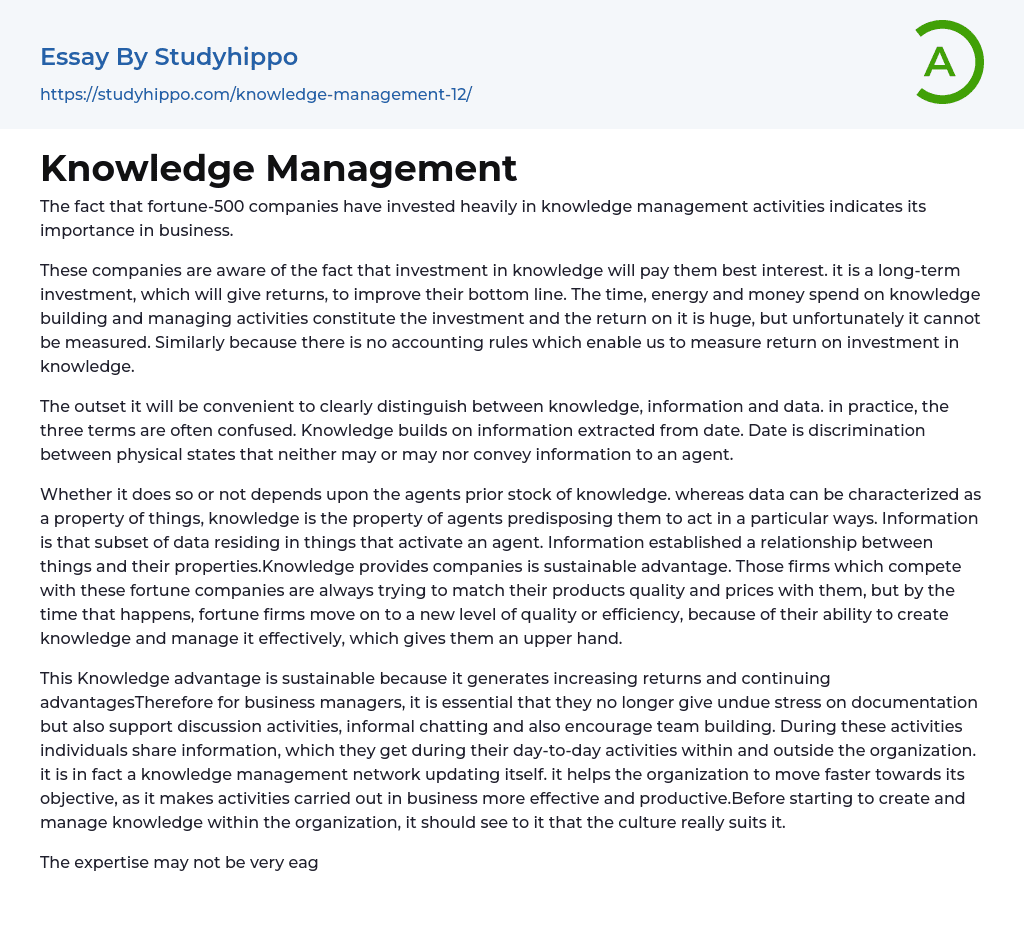Fortune 500 companies make significant investments in activities related to knowledge management, highlighting its importance in business.
Investing in knowledge is acknowledged by companies as a valuable long-term strategy that offers significant returns benefiting their bottom line. The investment requires dedicating funding, time, and energy to building and managing knowledge. Nevertheless, the absence of accounting regulations for measuring returns on this investment makes it impossible to quantify its benefits.
To differentiate between knowledge, information, and data, it is essential to comprehend that while they are frequently used interchangeably, knowledge is dependent on the information acquired from data. Data refers to the arrangement of physical states that may or may not communicate any information to an agent.
The ability of agents to act in certain ways depends on their prior stock of knowledge, while data pertains to the properties of things. Information, a s
...ubset of data that activates agents, establishes a relationship between things and their properties. Sustainable advantage is provided by knowledge for companies. Companies competing with such fortunate ones strive to match their product quality and prices, but these fortune companies evolve to newer levels of quality or efficiency, thanks to their effective management of knowledge creation, which gives them an upper hand.
To sustain the Knowledge advantage, generating increasing returns and ongoing advantages is crucial. Business managers must prioritize not only documentation but also activities like discussion, informal chatting, and team building to encourage individuals to share day-to-day information within and outside the organization. This creates a knowledge management network that updates itself, leading to more efficient and productive achievement of objectives. The organizational culture must be suitable for creating and managing knowledge before implementation.
Experts often
refuse to share their knowledge with others, especially their subordinates, in order to maintain their influence and importance. Therefore, it is the responsibility of management to promote knowledge management activities. Without such support, time and money invested in these activities will be wasted. Political issues within an organization can create barriers to sharing knowledge; thus, top management must establish a conducive environment for effective knowledge management. Although established companies may find it challenging to break away from traditional business practices when implementing knowledge management for the first time, novice organizations have the advantage of starting fresh and exploring new opportunities for building and sharing knowledge.
Business organizations recognize the high value of intellectual capital and are now implementing knowledge management centers within their firms. The primary role of a knowledge manager is to facilitate knowledge sharing by identifying knowledge sources such as knowledgeable people and encouraging them to contribute their intellectual inputs to others. Additionally, a knowledge manager will establish training programs, maintain an information processing system, and promote exchange of ideas and messages. The significance of a knowledge manager is exemplified by the following example.
According to a recent survey by Reuters, 38% of professionals report wasting time managing information, while 49% feel overwhelmed by the amount of information they receive. However, implementing an input form from a knowledge manager could potentially alleviate these issues.
- Investing essays
- Asset essays
- Depreciation essays
- Discounted Cash Flow essays
- Foreign Direct Investment essays
- Funds essays
- Internal Rate Of Return essays
- Revenue essays
- Day Trading essays
- Futures Trading essays
- Capital market essays
- Million essays
- Payment essays
- Rate Of Return essays
- Funding essays
- Hedge Fund essays
- John Locke essays
- 9/11 essays
- A Good Teacher essays
- A Healthy Diet essays
- A Modest Proposal essays
- A&P essays
- Academic Achievement essays
- Achievement essays
- Achieving goals essays
- Admission essays
- Advantages And Disadvantages Of Internet essays
- Alcoholic drinks essays
- Ammonia essays
- Analytical essays
- Ancient Olympic Games essays
- APA essays
- Arabian Peninsula essays
- Argument essays
- Argumentative essays
- Art essays
- Atlantic Ocean essays
- Auto-ethnography essays
- Autobiography essays
- Ballad essays
- Batman essays
- Binge Eating essays
- Black Power Movement essays
- Blogger essays
- Body Mass Index essays
- Book I Want a Wife essays
- Boycott essays
- Breastfeeding essays
- Bulimia Nervosa essays
- Business essays




